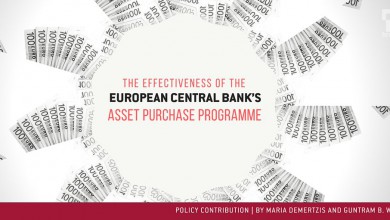German opposition to government-bond purchases by the European Central Bank is solidifying ahead of the programme’s likely announcement on January 22. Elections in Greece that could bring a government that will seek to negotiate the country’s debt with official creditors puts the ECB’s decision under even greater scrutiny. The fact that the ECB did not share losses in the previous round of Greek debt restructuring highlights the problem of sovereign QE, which is not feasible or will be ineffective if fiscal implications are excluded. The design of the programme is therefore crucial.
With the euro-area inflation rate at minus 0,2% and an increasing de-anchoring of inflation expectations, the ECB is falling far short of fulfilling its mandate of keeping inflation below but close to 2%. Many German economists and politicians downplay this failure by trying to re-define price stability as an inflation rate above zero. This is wrong for a number of reasons. A third of the sectors in the euro area, including in Germany, is in deflation. Low inflation is harmful because it makes price adjustment harder, undermines investment and renders debt service more difficult.
Monetary policy alone cannot fix all the problems of low growth and low inflation as many Germans rightly point out. Significant structural reforms and investment to stimulate higher demand will pay off rather quickly. A strong commitment to such reforms is essential for exiting the crisis. Nevertheless, the ECB should not and cannot hide behind slow government progress on reform, but should instead fulfill its mandate.
The reason for the growing German opposition to a sovereign QE programme is the fear that it could result in illicit monetary financing of governments. A QE programme would have to be combined with an implicit understanding that the ECB accepts losses on the same terms as private creditors in case of a debt restructuring. Otherwise, the purchase of low-rated government debt would be largely ineffective and could even lead to an increase in sovereign yields.The ECB has four options.
The first is to wait and hope for the best. This is the preferred strategy of many Germans, but would be dangerous and irresponsible. The more and longer that inflation expectations remain unanchored, the harder it will become for the ECB to regain credibility and achieve price stability, and the higher will be the real economic costs for the euro area and for Germany.
The second option would be to allocate the potential losses from purchases to the individual national central banks in the euro area. This might sound like an attractive option, but would be counter-productive by increasing sovereign spreads and worsening financial fragmentation within the euro area. And it would send a devastating signal that the single monetary policy would be single in name only.
The third option is to focus government bond purchases on highly rated debt only to limit the balance sheet risks to the ECB. This strategy could succeed, but the ECB would have to buy large amounts of already low-yielding, “safer” euro area sovereign debt and hope that private investors subsequently rebalance their portfolios towards riskier euro-area countries.
The fourth option– while accepting that the founding fathers of the euro might not have foreseen that monetary policy has to accept some fiscal risks – would be for the ECB to purchase sovereign debt according to the capital key of individual euro-area countries, with adjustments for those without sufficient amounts of privately held sovereign debt. The Treaty does not prohibit such purchases in secondary bond markets. The ECB’s governing council has expressed its intention to expand the balance sheet by €1 trillion. As this will hardly be possible with private sector assets only, the ECB could buy a portfolio of government debt combined with a portfolio of private debt.
The ECB needs to urgently show its uncompromising determination to fulfil its mandate and repair monetary transmission in the euro area. Accepting some fiscal risks is reasonable and unavoidable. The fourth option is the most promising strategy for the ECB to raise inflation expectations credibly and durably, avoid stagnation and help end the debt crisis. It is a risky strategy, but the other strategies are riskier.

